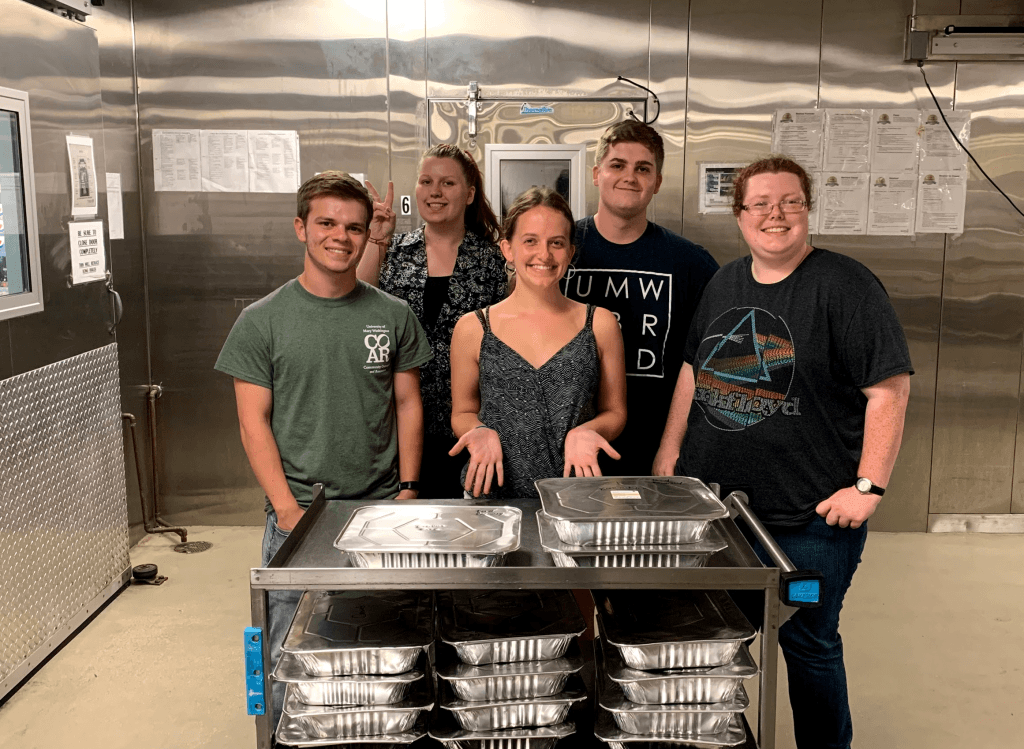Food Recovery welcomes new community partner
4 min read
Abigail Buchholz / The Blue and Gray Press
ABIGAIL BUCHHOLZ
News Editor
The Food Recovery program at UMW had their first recovery of the semester on Sept 16, collecting 90 pounds of food. It was then delivered to their new partner organization, the Thurman Brisben Center. Last semester, the program recovered almost 1,000 pounds of food to donate to local organizations.
The program, which is run through COAR, allows the university to reduce food waste while supporting their community and food-insecure individuals around the city.
For the foreseeable future, all the food collected from Monday dinners at the University Center dining hall will be delivered to the Thurman Brisben Center, a non-profit 501C emergency homeless shelter. The Brisben Center provides restorative services to enable its residents to succeed in their journey back into permanent housing. The center serves their residents an average of 95,000 meals per year. In order to provide these services, the center depends 100 percent on community sponsors and donated food.
“During the weekday lunches, we have less sponsors as most people are working. This recovery program is very important as we will have healthy, nutritious meals offered for lunch and will just need volunteers to reheat it and serve it,” said Joe Hargrove, the volunteer coordinator at the Brisben Center.
The value of the Food Recovery program is not lost on UMW students.
“We have so much leftover food. The fact that our food is literally going to feed these people, it’s nutritious food… it’s feeding these people directly and you’re making this impact,” said Carleigh Rahn, a sophomore English major and COAR council liaison.
According to Hargrove, during fiscal year 2019 the Brisben Center has sheltered 550 individuals, a group which consisted of 82 children, 69 families, 137 single women, 252 single men and 48 veterans.
“I enjoy being able to help, even if I haven’t been down to the center personally because of school and work. The one hour I take out of my week to help out possibly helps ten to twenty people get food. Just knowing that is satisfaction enough,” said freshman Lyndsey Clark.
Any student is welcome to participate in the food recovery events.
Currently, the food collected for the Brisben Center comes from Monday night dinners. According to Abigail Slaughter, a sophomore Spanish major and co-leader of food recovery, the recovery program doesn’t currently have the resources to collect food multiple days a week.
“This is what works for us for now… You have to line up if the dining hall has food, if you have transportation, which we normally do- the COAR van is what we used to transport the food. So since there’s a lot of moving parts and we’re just now getting our footing with this new partner organization it’s just going to be Monday for now,” said Slaughter.
The food collected for the Brisben Center is stored in the UC overnight until it is picked up on Tuesday mornings by Slaughter. The majority of leftover food is packaged, but there are a few limitations to what can be safely taken.
“We don’t take soup, it’s hard to transport and it will spill whether you’re a careful driver or not. It just will happen,” said Slaughter.
Slaughter is one of the few who has been able to see first hand the impact the UMW Food Recovery program has at the Brisben Center.
“Today was our first delivery actually. I got there and saw all these sweet kids and parents eating breakfast and I’m like ‘this is going to be their dinner tonight,’ it kind of hit me,” said Slaughter.
Students who participated in the first food recovery of the semester for the Brisben Center described the experience as eye opening.
“I thought the first recovery was fun. However, it made me realize how much food goes to waste and made me appreciate what Food Recovery is doing by taking the food to those who need it,” said Clark.
“I think it [food recovery] is really important, you shouldn’t expect people to just be on their feet immediately. There’s a pretty big homeless population in Fredericksburg, which I didn’t know before volunteering for Food Recovery. It’s been a big eye opener about people, your neighbors could need this help. It’s nothing to be ashamed of, it’s just life. If you need a meal you should be able to get one,” said Slaughter.
This semester the Food Recovery program hopes to collect 1,000 pounds of food for the Brisben Center. Slaughter also hopes to spread the group’s mission around campus in order to encourage more participation.
“I feel like starting at the local level is so important because seeing the impact that this program can make is only going to broaden our horizons and help us secure other opportunities like bring more people on maybe or donate to multiple places or have multiple food recoveries a week,” said Slaughter.











